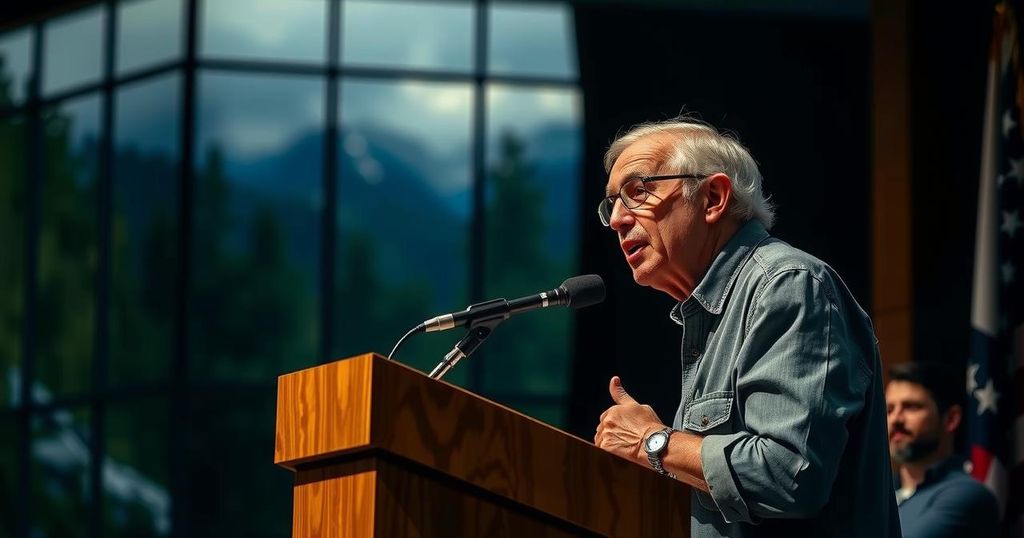Aaron Mair Discusses Intersectionality in Climate Crisis at Human Rights Institute Lecture

Aaron Mair, former Sierra Club president, delivered a lecture on intersectionality and the climate crisis, emphasizing the disproportionate effects on marginalized communities and the need for collective action and civic engagement. The Human Rights Institute plans to further explore these themes in upcoming courses and initiatives.
On Thursday, Aaron Mair, an esteemed activist and former president of the Sierra Club, delivered a lecture hosted by the Human Rights Institute, focusing on the themes of intersectionality and the climate crisis. The event, held in Casadesus Recital Hall, came in the wake of the United Nations COP 28 summit, where global leaders discuss strategies to combat climate change. Mair underscored the distinct and disproportionate impact of climate change on marginalized communities, advocating for an intersectional approach that respects and responds to the varied needs and vulnerabilities of these groups. Co-directors of the Human Rights Institute, Professor David Cingranelli and Professor Alexandra Moore, played pivotal roles in coordinating the event. Cingranelli emphasized the necessity for discourse concerning environmental issues, stating that “Climate change is one of the most significant threats to human dignity.” He expressed confidence in an upsurge of activism among young individuals, as they possess the most to lose amidst the climate crisis. Mair, a trailblazer in environmental activism and the first Black president of the Sierra Club, spoke passionately about the systemic disparities within the climate crisis. He implored that the impacts are felt both in the United States and in the Global South, with particular emphasis on countries governed without democratic structures. He lamented the loss of many environmental activists worldwide, reflecting on reports of violence against those championing ecological preservation. “We’ve got hundreds of wilderness activists that have been killed, murdered, shot, not only in Africa, but also in Central America, Latin America,” Mair stated. He dissected the socio-political exploitation that exacerbates environmental degradation, using Hurricane Katrina as an example to illustrate how systemic injustices create compounded crises for communities of color. In his address, Mair called for proactive engagement among students, highlighting the critical contributions of young activists to the intertwining challenges of environmental protection and human rights. He stated: “I think someone mentioned that that term, intersectionality, is kind of overused, we hear it everywhere, but it’s an analytical lens and framework, and that’s what universities give you, analytical lenses and frameworks by which we can achieve great breakthroughs.” Mair advocated for a holistic understanding that merges scientific knowledge with social justice awareness when confronting climate change. He affirmed the historical role of communities of color in leading the fight against climate change, thus necessitating inclusive solutions. Furthermore, he emphasized the importance for students to exercise their civic duties through voting to ensure political and societal change for the betterment of humanity. The Human Rights Institute intends to build on Mair’s insights by introducing a new course, “Climate, Crime & Human Rights,” in the winter semester, which will explore critical themes such as eco-terrorism and historical environmental disasters. Moore highlighted the Institute’s commitment to advancing research and advocacy in environmental sustainability and human rights. The lecture concluded with a reaffirmation of the collaborative efforts between the Human Rights Institute and various community initiatives aimed at fostering dialogue and actions concerning pressing environmental and social justice issues. Mair’s lecture served as a clarion call for collective action, urging individuals and communities to unite in the common goal of creating equitable and sustainable solutions to the ongoing climate crisis.
The intersection between climate change and social justice has garnered increasing attention in recent years, particularly in light of the disproportionate effects felt by marginalized communities. The Human Rights Institute has been a proponent of this discourse, promoting education and advocacy for environmental justice. The significance of collaborative efforts in addressing these urgent issues is underscored by international summits such as COP 28, where leaders attempt to forge agreements on climate change strategies. Aaron Mair’s leadership in the environmental movement represents a pivotal voice in the discussion of equitable climate action and the need for inclusivity in environmental policies.
In summary, Aaron Mair’s lecture emphasized the urgent need for an intersectional approach to the climate crisis, highlighting the disproportionate impact on marginalized communities. His insights into the systemic inequalities exacerbated by climate change and his call for active civic engagement resonate strongly in the current discourse around social justice and environmental sustainability. The anticipation of future educational courses at the Human Rights Institute indicates ongoing commitment to these pressing issues.
Original Source: www.bupipedream.com





